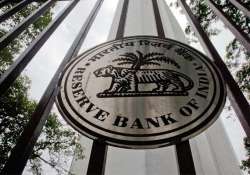RBI tightens NBFC norms, tougher rules for deposit-taking companies
Mumbai: In the wake of public investors increasingly being defrauded in the name of non-banking financial services, RBI today tightened its norms for NBFCs by requiring them to have a much stronger capital base, failing

Mumbai: In the wake of public investors increasingly being defrauded in the name of non-banking financial services, RBI today tightened its norms for NBFCs by requiring them to have a much stronger capital base, failing which they would lose their registration.
The NBFCs (Non Banking Financial Companies) would be subjected to a stronger set of rules and regulations if they raise public deposits, RBI said while announcing a new set of norms that also mandate a huge eight-fold increase in the minimum 'net owned fund' requirement from Rs 25 lakh to Rs 2 crore by 2017 in a phased manner.
The move comes at a time when thousands of companies, including various small entities and some large ones, have been under the scanner for illicit fund-raising activities across the country.
After the much-publicised Saradha scam came to fore in West Bengal last year, the government had forwarded to RBI a list of over 30,000 so-called NBFCs for further probe into their operations. It was found that a majority of these firms were not even authorised to carry out public-deposit business.
In India, total assets being managed by the financial sector is estimated at USD 2.8 trillion, out of which over USD 300 billion are with NBFCs.
With a view to streamline the regulations for the NBFC space, RBI said it would cancel the registration if the companies fail to adhere to norms, starting April 1, 2015 in a phased manner, as against the current practice of 'temporary suspension' of Certificate of Registration (CoR).
As per the latest directives, RBI has raised the limit for NBFCs to maintain the Net Owned Fund (NOF) requirement to to Rs 2 crore. At present, the NOF requirement is Rs 25 lakh. In a phased manner, the NBFCs would be required to raise it to Rs 1 crore by March 2016 and to further double it to Rs 2 crore by 2017.
"NBFCs failing to achieve the prescribed ceiling within the stipulated time period shall not be eligible to hold the CoR (Certificate of Registration) as NBFCs. The Bank will initiate the process for cancellation of CoR against such NBFCs," it said in a notification.
"Those accepting public funds will be subjected to limited prudential regulations but not conduct of business regulations if they have no customer interface...Where both public funds are accepted and customer interface exist, such companies will be subjected both to limited prudential regulations and conduct of business regulations," RBI said.
However, the norms would be relatively easier for the NBFCs which neither access public funds nor have a customer-facing business.
Further, NBFCs with assets of Rs 500 crore and above, irrespective of whether they have accessed public funds or not, would have to comply with a stronger set of rules including for fair conduct of business regulations and they would be considered systematically important.
RBI said that the revised guidelines were issued as NBFCs are now deeply interconnected with the entities in the financial sector and they have evolved considerably in terms of size, operations, technological sophistication, and entry into newer areas of financial services and products.
"Being financial entities, they are as exposed to risks arising out of counter party failures, funding and asset concentration, interest rate movement and risks pertaining to liquidity and solvency, as any other financial sector player."
"...There is therefore, a felt need to address the risks, without impeding the dynamism displayed by NBFCs in delivering innovation and last mile connectivity for meeting the credit needs of the productive sectors of the economy."
While issuing the revised guidelines, RBI said certain important recommendations made by the Working Group on Issues and Concerns in the NBFC Sector, chaired by Usha Thorat and the Committee on Comprehensive Financial Services for Small Businesses and Low Income Households, chaired Nachiket Mor, have been drawn upon.
The NBFCs primarily engaged in lending against gold jewellery, will have to maintain a minimum tier I capital (or equity capital) of 12 per cent with effective from April 1, 2014 as against existing requirement of 10 per cent.
For deposit and non-deposit taking NBFCs, Capital to Risk (Weighted) Assets Ratio or CRAR, which includes tier I capital of 7.5 per cent, is 15 per cent at present.
However, as per the new norms, NBFCs have to raise the tier I capital to 8.5 per cent by end of March 2016 and 10 per cent by March, 31, 2017.
Towards provisioning of standard assets, RBI said that NBFCs would be required to raise it to 0.3 per cent by end of March 2016; 0.35 per cent by March 2017 and to 0.4 per cent by end of March 2018.
Presently, every NBFC is required to make a provision for standard assets at 0.25 per cent of the outstanding.
In the interest of harmonisation, the asset classification norms for certain classes of NBFCs will be brought in line with that of banks, RBI said.
"At present, an asset is classified as Non-Performing Asset when it has remained overdue for a period of six months or more for loans; and overdue for twelve months or more in case of lease rental and hire purchase instalments, as compared to 90 days for banks."